Comprehensive Report: Mental Health, Dementia, and Elderly Care
VerifiedAdded on 2023/06/08
|6
|1285
|163
Report
AI Summary
This report provides an overview of dementia and its impact on mental health, focusing on older adults. It begins by defining dementia and discussing its various stages, assessment methods, and therapeutic interventions. The report then explores the assessment of mental health and well-being in older adults, along with current models of care. The dementia model of care, specifically the butterfly model, is also discussed. Furthermore, the report delves into the behavioral and psychological symptoms associated with dementia, providing a comprehensive understanding of the condition. The report also examines the relationship between mental and physical health processes. The study also focuses on the different neurological disorders, including vascular pathology, Parkinson's disease, and other factors contributing to dementia.
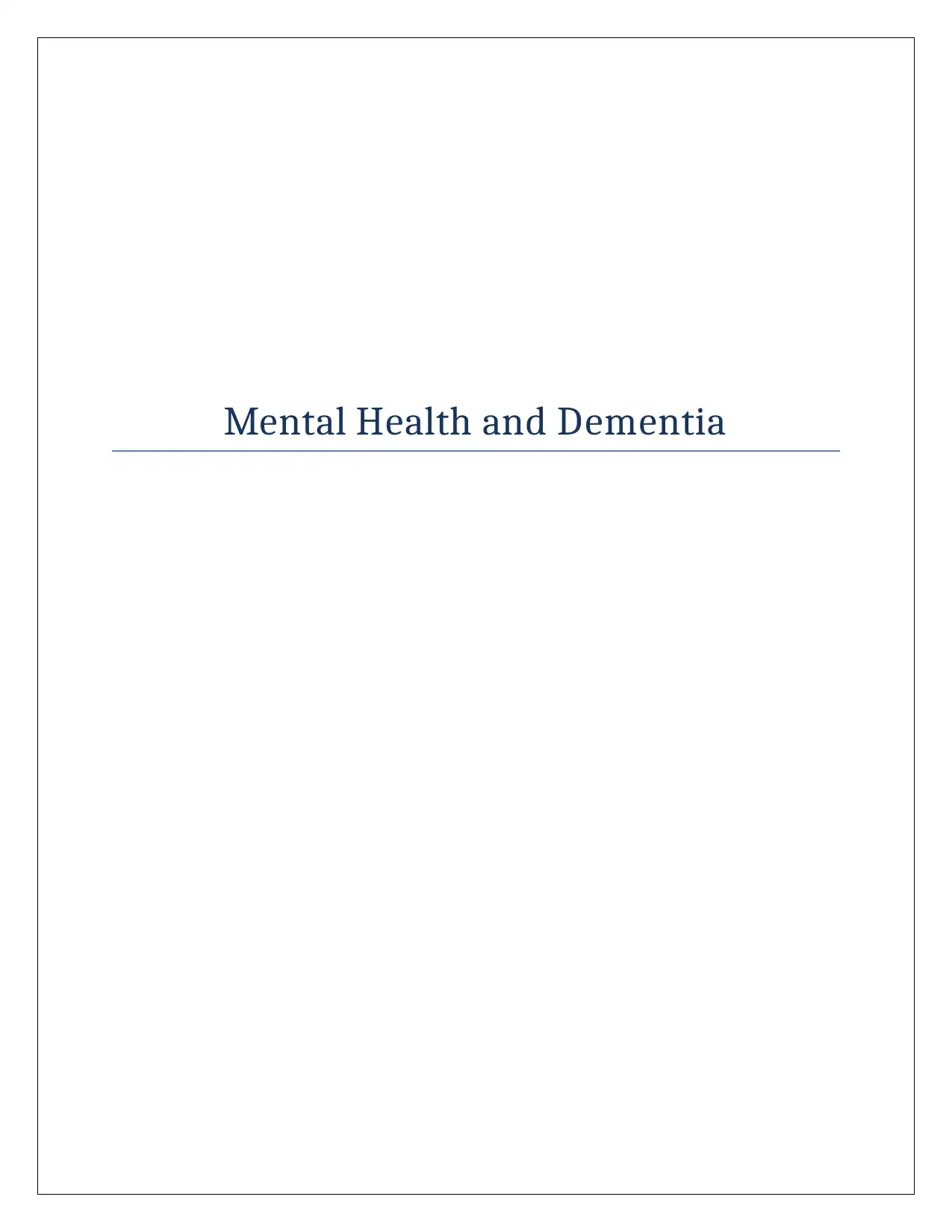
Mental Health and Dementia
Paraphrase This Document
Need a fresh take? Get an instant paraphrase of this document with our AI Paraphraser
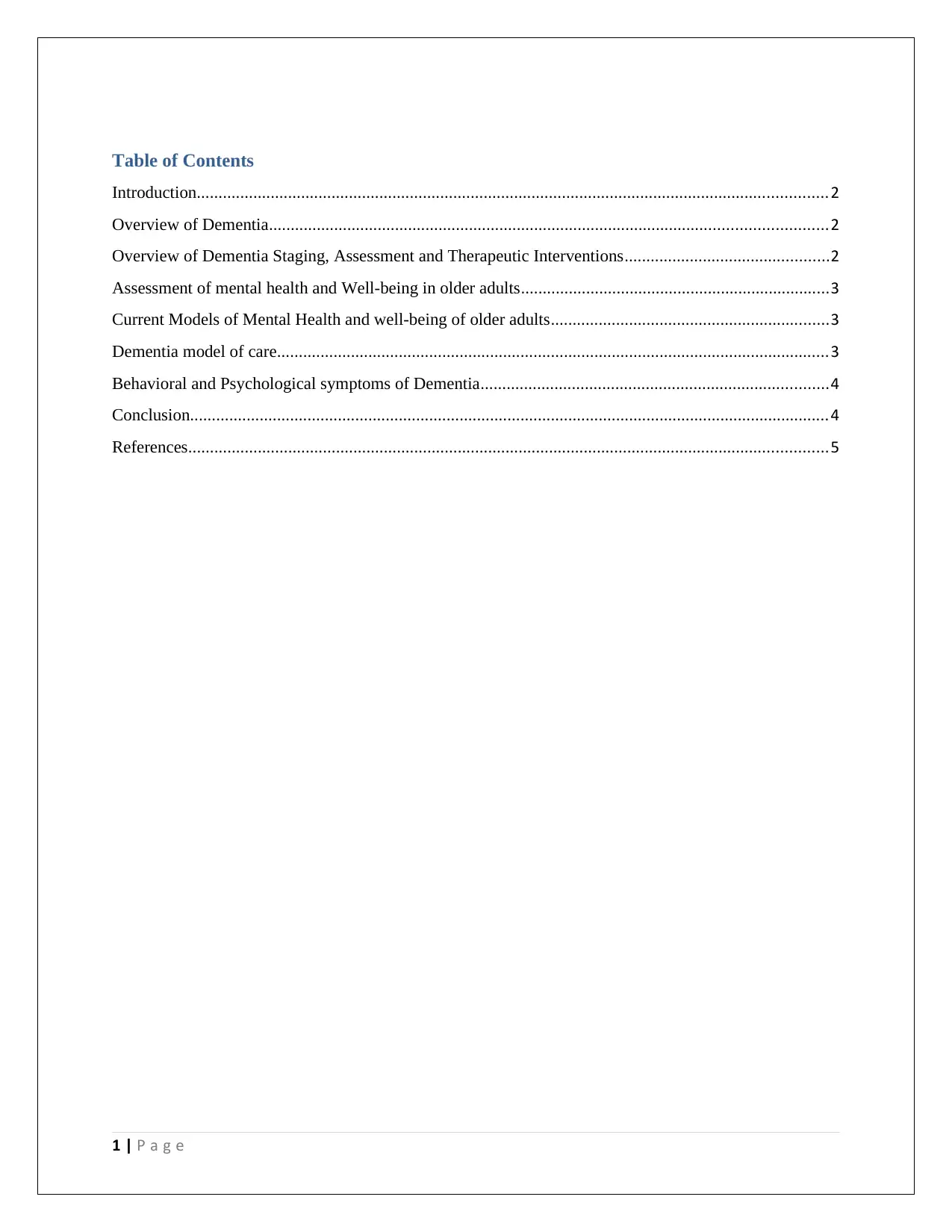
Table of Contents
Introduction.................................................................................................................................................2
Overview of Dementia................................................................................................................................2
Overview of Dementia Staging, Assessment and Therapeutic Interventions...............................................2
Assessment of mental health and Well-being in older adults.......................................................................3
Current Models of Mental Health and well-being of older adults................................................................3
Dementia model of care...............................................................................................................................3
Behavioral and Psychological symptoms of Dementia................................................................................4
Conclusion...................................................................................................................................................4
References...................................................................................................................................................5
1 | P a g e
Introduction.................................................................................................................................................2
Overview of Dementia................................................................................................................................2
Overview of Dementia Staging, Assessment and Therapeutic Interventions...............................................2
Assessment of mental health and Well-being in older adults.......................................................................3
Current Models of Mental Health and well-being of older adults................................................................3
Dementia model of care...............................................................................................................................3
Behavioral and Psychological symptoms of Dementia................................................................................4
Conclusion...................................................................................................................................................4
References...................................................................................................................................................5
1 | P a g e
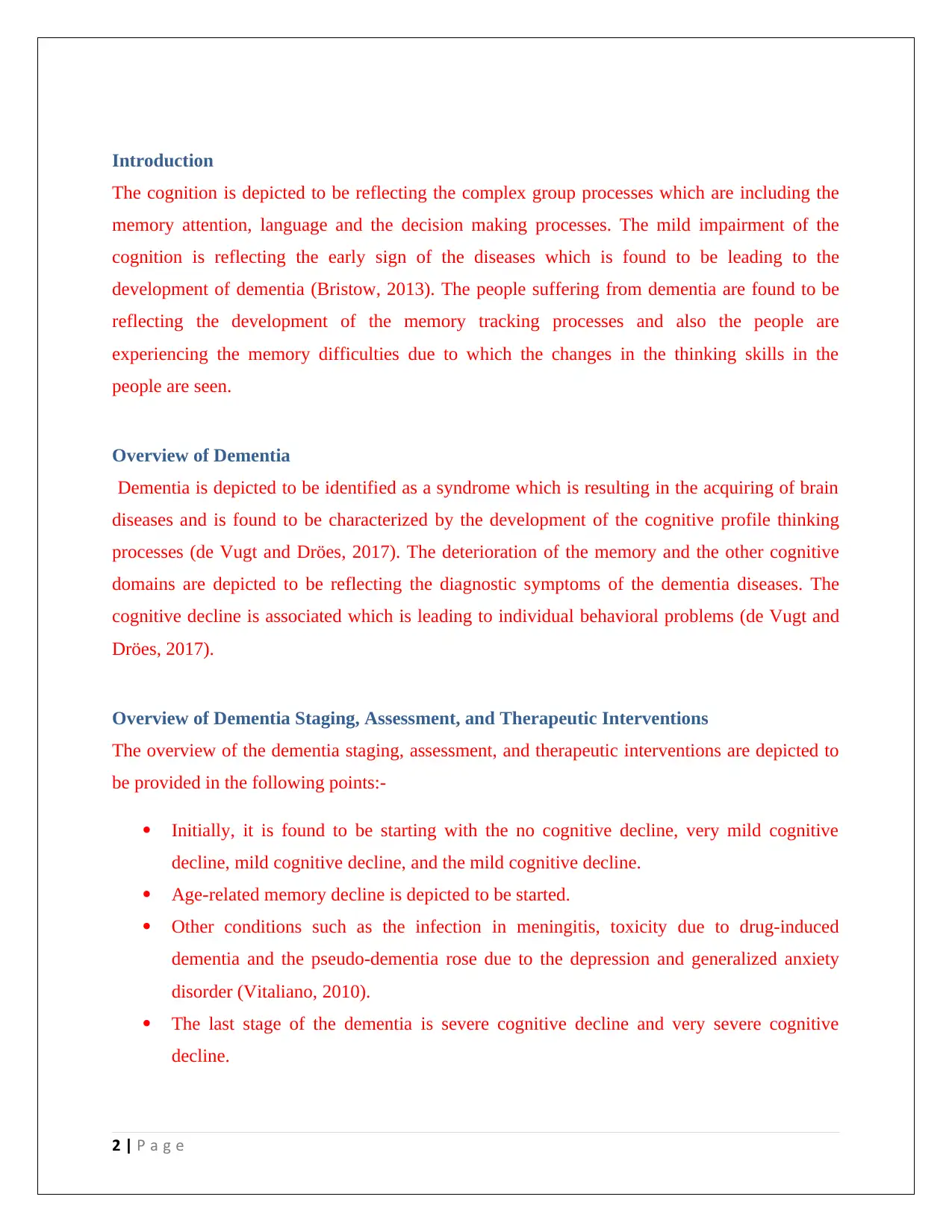
Introduction
The cognition is depicted to be reflecting the complex group processes which are including the
memory attention, language and the decision making processes. The mild impairment of the
cognition is reflecting the early sign of the diseases which is found to be leading to the
development of dementia (Bristow, 2013). The people suffering from dementia are found to be
reflecting the development of the memory tracking processes and also the people are
experiencing the memory difficulties due to which the changes in the thinking skills in the
people are seen.
Overview of Dementia
Dementia is depicted to be identified as a syndrome which is resulting in the acquiring of brain
diseases and is found to be characterized by the development of the cognitive profile thinking
processes (de Vugt and Dröes, 2017). The deterioration of the memory and the other cognitive
domains are depicted to be reflecting the diagnostic symptoms of the dementia diseases. The
cognitive decline is associated which is leading to individual behavioral problems (de Vugt and
Dröes, 2017).
Overview of Dementia Staging, Assessment, and Therapeutic Interventions
The overview of the dementia staging, assessment, and therapeutic interventions are depicted to
be provided in the following points:-
Initially, it is found to be starting with the no cognitive decline, very mild cognitive
decline, mild cognitive decline, and the mild cognitive decline.
Age-related memory decline is depicted to be started.
Other conditions such as the infection in meningitis, toxicity due to drug-induced
dementia and the pseudo-dementia rose due to the depression and generalized anxiety
disorder (Vitaliano, 2010).
The last stage of the dementia is severe cognitive decline and very severe cognitive
decline.
2 | P a g e
The cognition is depicted to be reflecting the complex group processes which are including the
memory attention, language and the decision making processes. The mild impairment of the
cognition is reflecting the early sign of the diseases which is found to be leading to the
development of dementia (Bristow, 2013). The people suffering from dementia are found to be
reflecting the development of the memory tracking processes and also the people are
experiencing the memory difficulties due to which the changes in the thinking skills in the
people are seen.
Overview of Dementia
Dementia is depicted to be identified as a syndrome which is resulting in the acquiring of brain
diseases and is found to be characterized by the development of the cognitive profile thinking
processes (de Vugt and Dröes, 2017). The deterioration of the memory and the other cognitive
domains are depicted to be reflecting the diagnostic symptoms of the dementia diseases. The
cognitive decline is associated which is leading to individual behavioral problems (de Vugt and
Dröes, 2017).
Overview of Dementia Staging, Assessment, and Therapeutic Interventions
The overview of the dementia staging, assessment, and therapeutic interventions are depicted to
be provided in the following points:-
Initially, it is found to be starting with the no cognitive decline, very mild cognitive
decline, mild cognitive decline, and the mild cognitive decline.
Age-related memory decline is depicted to be started.
Other conditions such as the infection in meningitis, toxicity due to drug-induced
dementia and the pseudo-dementia rose due to the depression and generalized anxiety
disorder (Vitaliano, 2010).
The last stage of the dementia is severe cognitive decline and very severe cognitive
decline.
2 | P a g e
⊘ This is a preview!⊘
Do you want full access?
Subscribe today to unlock all pages.

Trusted by 1+ million students worldwide
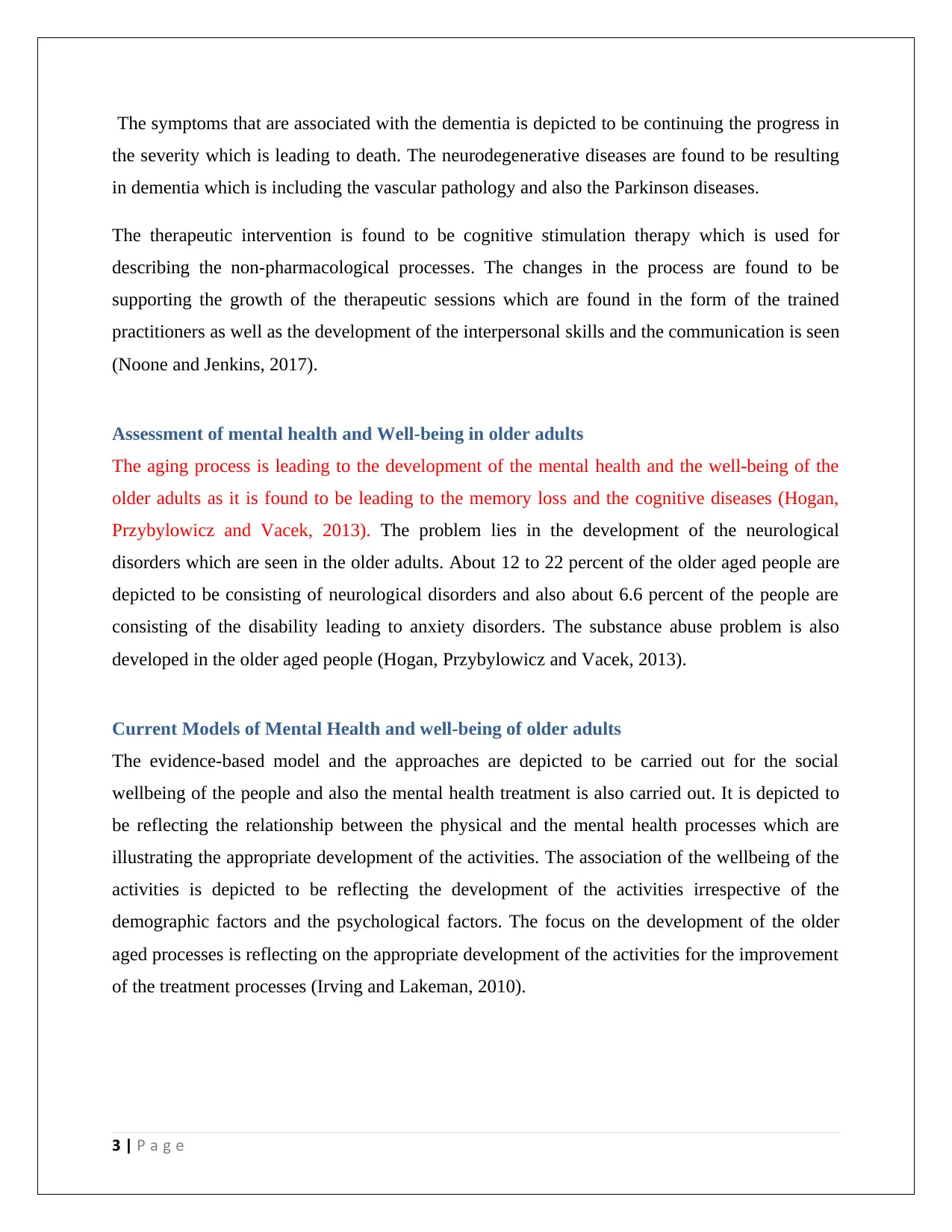
The symptoms that are associated with the dementia is depicted to be continuing the progress in
the severity which is leading to death. The neurodegenerative diseases are found to be resulting
in dementia which is including the vascular pathology and also the Parkinson diseases.
The therapeutic intervention is found to be cognitive stimulation therapy which is used for
describing the non-pharmacological processes. The changes in the process are found to be
supporting the growth of the therapeutic sessions which are found in the form of the trained
practitioners as well as the development of the interpersonal skills and the communication is seen
(Noone and Jenkins, 2017).
Assessment of mental health and Well-being in older adults
The aging process is leading to the development of the mental health and the well-being of the
older adults as it is found to be leading to the memory loss and the cognitive diseases (Hogan,
Przybylowicz and Vacek, 2013). The problem lies in the development of the neurological
disorders which are seen in the older adults. About 12 to 22 percent of the older aged people are
depicted to be consisting of neurological disorders and also about 6.6 percent of the people are
consisting of the disability leading to anxiety disorders. The substance abuse problem is also
developed in the older aged people (Hogan, Przybylowicz and Vacek, 2013).
Current Models of Mental Health and well-being of older adults
The evidence-based model and the approaches are depicted to be carried out for the social
wellbeing of the people and also the mental health treatment is also carried out. It is depicted to
be reflecting the relationship between the physical and the mental health processes which are
illustrating the appropriate development of the activities. The association of the wellbeing of the
activities is depicted to be reflecting the development of the activities irrespective of the
demographic factors and the psychological factors. The focus on the development of the older
aged processes is reflecting on the appropriate development of the activities for the improvement
of the treatment processes (Irving and Lakeman, 2010).
3 | P a g e
the severity which is leading to death. The neurodegenerative diseases are found to be resulting
in dementia which is including the vascular pathology and also the Parkinson diseases.
The therapeutic intervention is found to be cognitive stimulation therapy which is used for
describing the non-pharmacological processes. The changes in the process are found to be
supporting the growth of the therapeutic sessions which are found in the form of the trained
practitioners as well as the development of the interpersonal skills and the communication is seen
(Noone and Jenkins, 2017).
Assessment of mental health and Well-being in older adults
The aging process is leading to the development of the mental health and the well-being of the
older adults as it is found to be leading to the memory loss and the cognitive diseases (Hogan,
Przybylowicz and Vacek, 2013). The problem lies in the development of the neurological
disorders which are seen in the older adults. About 12 to 22 percent of the older aged people are
depicted to be consisting of neurological disorders and also about 6.6 percent of the people are
consisting of the disability leading to anxiety disorders. The substance abuse problem is also
developed in the older aged people (Hogan, Przybylowicz and Vacek, 2013).
Current Models of Mental Health and well-being of older adults
The evidence-based model and the approaches are depicted to be carried out for the social
wellbeing of the people and also the mental health treatment is also carried out. It is depicted to
be reflecting the relationship between the physical and the mental health processes which are
illustrating the appropriate development of the activities. The association of the wellbeing of the
activities is depicted to be reflecting the development of the activities irrespective of the
demographic factors and the psychological factors. The focus on the development of the older
aged processes is reflecting on the appropriate development of the activities for the improvement
of the treatment processes (Irving and Lakeman, 2010).
3 | P a g e
Paraphrase This Document
Need a fresh take? Get an instant paraphrase of this document with our AI Paraphraser
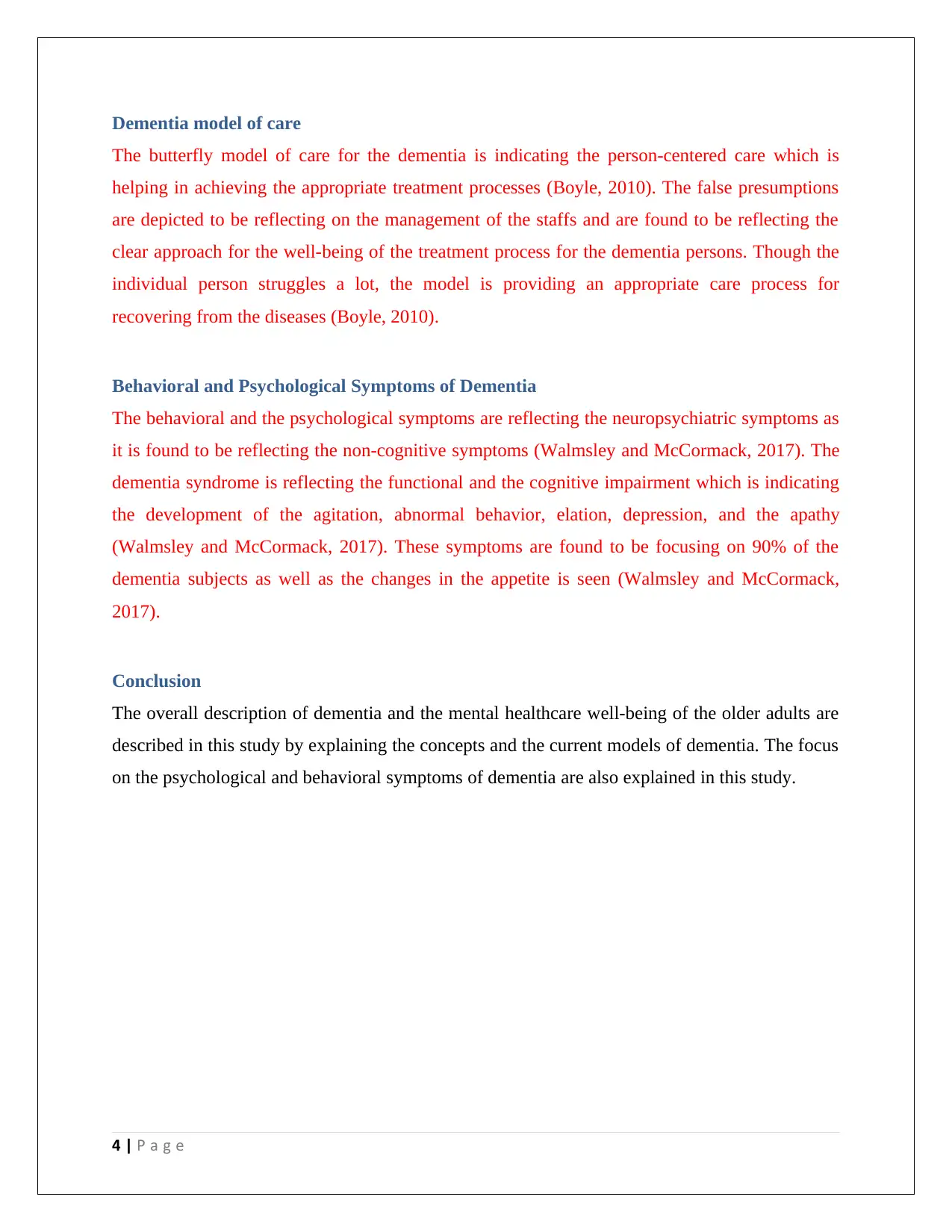
Dementia model of care
The butterfly model of care for the dementia is indicating the person-centered care which is
helping in achieving the appropriate treatment processes (Boyle, 2010). The false presumptions
are depicted to be reflecting on the management of the staffs and are found to be reflecting the
clear approach for the well-being of the treatment process for the dementia persons. Though the
individual person struggles a lot, the model is providing an appropriate care process for
recovering from the diseases (Boyle, 2010).
Behavioral and Psychological Symptoms of Dementia
The behavioral and the psychological symptoms are reflecting the neuropsychiatric symptoms as
it is found to be reflecting the non-cognitive symptoms (Walmsley and McCormack, 2017). The
dementia syndrome is reflecting the functional and the cognitive impairment which is indicating
the development of the agitation, abnormal behavior, elation, depression, and the apathy
(Walmsley and McCormack, 2017). These symptoms are found to be focusing on 90% of the
dementia subjects as well as the changes in the appetite is seen (Walmsley and McCormack,
2017).
Conclusion
The overall description of dementia and the mental healthcare well-being of the older adults are
described in this study by explaining the concepts and the current models of dementia. The focus
on the psychological and behavioral symptoms of dementia are also explained in this study.
4 | P a g e
The butterfly model of care for the dementia is indicating the person-centered care which is
helping in achieving the appropriate treatment processes (Boyle, 2010). The false presumptions
are depicted to be reflecting on the management of the staffs and are found to be reflecting the
clear approach for the well-being of the treatment process for the dementia persons. Though the
individual person struggles a lot, the model is providing an appropriate care process for
recovering from the diseases (Boyle, 2010).
Behavioral and Psychological Symptoms of Dementia
The behavioral and the psychological symptoms are reflecting the neuropsychiatric symptoms as
it is found to be reflecting the non-cognitive symptoms (Walmsley and McCormack, 2017). The
dementia syndrome is reflecting the functional and the cognitive impairment which is indicating
the development of the agitation, abnormal behavior, elation, depression, and the apathy
(Walmsley and McCormack, 2017). These symptoms are found to be focusing on 90% of the
dementia subjects as well as the changes in the appetite is seen (Walmsley and McCormack,
2017).
Conclusion
The overall description of dementia and the mental healthcare well-being of the older adults are
described in this study by explaining the concepts and the current models of dementia. The focus
on the psychological and behavioral symptoms of dementia are also explained in this study.
4 | P a g e
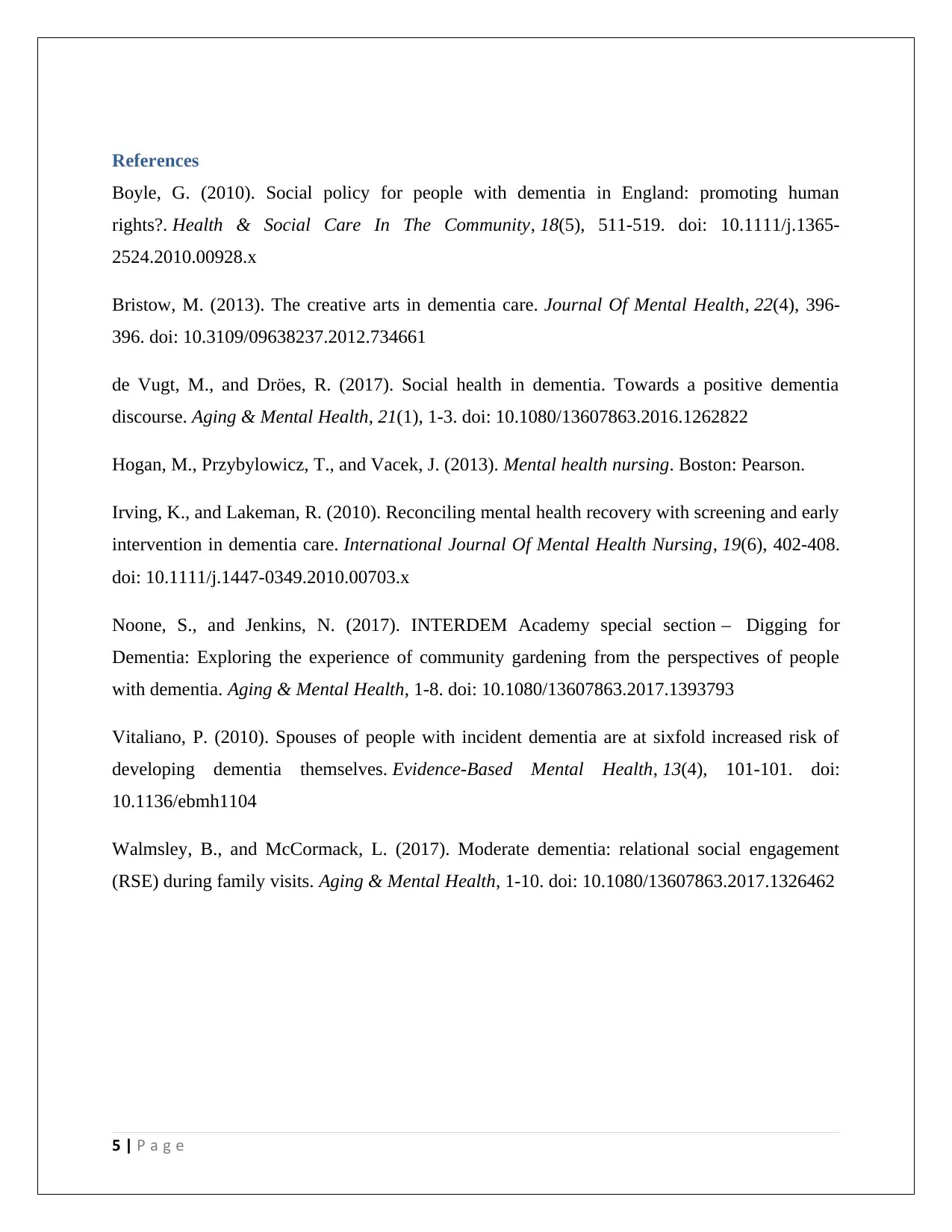
References
Boyle, G. (2010). Social policy for people with dementia in England: promoting human
rights?. Health & Social Care In The Community, 18(5), 511-519. doi: 10.1111/j.1365-
2524.2010.00928.x
Bristow, M. (2013). The creative arts in dementia care. Journal Of Mental Health, 22(4), 396-
396. doi: 10.3109/09638237.2012.734661
de Vugt, M., and Dröes, R. (2017). Social health in dementia. Towards a positive dementia
discourse. Aging & Mental Health, 21(1), 1-3. doi: 10.1080/13607863.2016.1262822
Hogan, M., Przybylowicz, T., and Vacek, J. (2013). Mental health nursing. Boston: Pearson.
Irving, K., and Lakeman, R. (2010). Reconciling mental health recovery with screening and early
intervention in dementia care. International Journal Of Mental Health Nursing, 19(6), 402-408.
doi: 10.1111/j.1447-0349.2010.00703.x
Noone, S., and Jenkins, N. (2017). INTERDEM Academy special section – Digging for
Dementia: Exploring the experience of community gardening from the perspectives of people
with dementia. Aging & Mental Health, 1-8. doi: 10.1080/13607863.2017.1393793
Vitaliano, P. (2010). Spouses of people with incident dementia are at sixfold increased risk of
developing dementia themselves. Evidence-Based Mental Health, 13(4), 101-101. doi:
10.1136/ebmh1104
Walmsley, B., and McCormack, L. (2017). Moderate dementia: relational social engagement
(RSE) during family visits. Aging & Mental Health, 1-10. doi: 10.1080/13607863.2017.1326462
5 | P a g e
Boyle, G. (2010). Social policy for people with dementia in England: promoting human
rights?. Health & Social Care In The Community, 18(5), 511-519. doi: 10.1111/j.1365-
2524.2010.00928.x
Bristow, M. (2013). The creative arts in dementia care. Journal Of Mental Health, 22(4), 396-
396. doi: 10.3109/09638237.2012.734661
de Vugt, M., and Dröes, R. (2017). Social health in dementia. Towards a positive dementia
discourse. Aging & Mental Health, 21(1), 1-3. doi: 10.1080/13607863.2016.1262822
Hogan, M., Przybylowicz, T., and Vacek, J. (2013). Mental health nursing. Boston: Pearson.
Irving, K., and Lakeman, R. (2010). Reconciling mental health recovery with screening and early
intervention in dementia care. International Journal Of Mental Health Nursing, 19(6), 402-408.
doi: 10.1111/j.1447-0349.2010.00703.x
Noone, S., and Jenkins, N. (2017). INTERDEM Academy special section – Digging for
Dementia: Exploring the experience of community gardening from the perspectives of people
with dementia. Aging & Mental Health, 1-8. doi: 10.1080/13607863.2017.1393793
Vitaliano, P. (2010). Spouses of people with incident dementia are at sixfold increased risk of
developing dementia themselves. Evidence-Based Mental Health, 13(4), 101-101. doi:
10.1136/ebmh1104
Walmsley, B., and McCormack, L. (2017). Moderate dementia: relational social engagement
(RSE) during family visits. Aging & Mental Health, 1-10. doi: 10.1080/13607863.2017.1326462
5 | P a g e
⊘ This is a preview!⊘
Do you want full access?
Subscribe today to unlock all pages.

Trusted by 1+ million students worldwide
1 out of 6
Related Documents
Your All-in-One AI-Powered Toolkit for Academic Success.
+13062052269
info@desklib.com
Available 24*7 on WhatsApp / Email
![[object Object]](/_next/static/media/star-bottom.7253800d.svg)
Unlock your academic potential
Copyright © 2020–2026 A2Z Services. All Rights Reserved. Developed and managed by ZUCOL.




